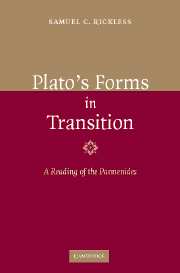Book contents
- Frontmatter
- Contents
- Preface
- List of abbreviations
- Introduction
- Chapter 1 The theory of forms
- Chapter 2 The theory criticized
- Chapter 3 The theory modified: methodology
- Chapter 4 The First Deduction
- Chapter 5 The Second Deduction
- Chapter 6 From the Appendix to the Fourth Deduction
- Chapter 7 From the Fifth to the Eighth Deduction
- Conclusion
- References
- Index of forms discussed
- Index of Deductions
- Index of passages cited
- General index
Preface
Published online by Cambridge University Press: 22 September 2009
- Frontmatter
- Contents
- Preface
- List of abbreviations
- Introduction
- Chapter 1 The theory of forms
- Chapter 2 The theory criticized
- Chapter 3 The theory modified: methodology
- Chapter 4 The First Deduction
- Chapter 5 The Second Deduction
- Chapter 6 From the Appendix to the Fourth Deduction
- Chapter 7 From the Fifth to the Eighth Deduction
- Conclusion
- References
- Index of forms discussed
- Index of Deductions
- Index of passages cited
- General index
Summary
This book came into existence by accident. My graduate training (at Oxford and UCLA) was not in ancient philosophy, but primarily in the philosophy of language. My first job out of graduate school was at Florida State University, where I taught courses on descriptivism, direct reference, and propositional attitude reports. For a year or so after I was hired, I searched for a new project, without much success. Then, in January 1997, I decided to attend a graduate seminar on the Parmenides taught by my then colleague, Russ Dancy. I remembered that my college mentor, Warren Goldfarb, had once discussed what he called a “third man” argument purporting to show that what accounts for the unity of a proposition cannot, on pain of infinite regress, be part of the proposition. I knew that the name for this argument had come from the Parmenides, and this sparked my interest in the seminar. Russ, with his wealth of erudition and sharp intellect, listened patiently and provided encouragement as I struggled to give voice to naïve suggestions that more often than not simply led nowhere. But by the end of the semester, I realized that I was called to the study of Plato and sat down to write “How Parmenides Saved the Theory of Forms.”
The project of writing this book began with the realization that my article had provided a cursory, and in the end inaccurate, interpretation of the second half of the Parmenides.
Information
- Type
- Chapter
- Information
- Plato's Forms in TransitionA Reading of the Parmenides, pp. ix - xiPublisher: Cambridge University PressPrint publication year: 2006
